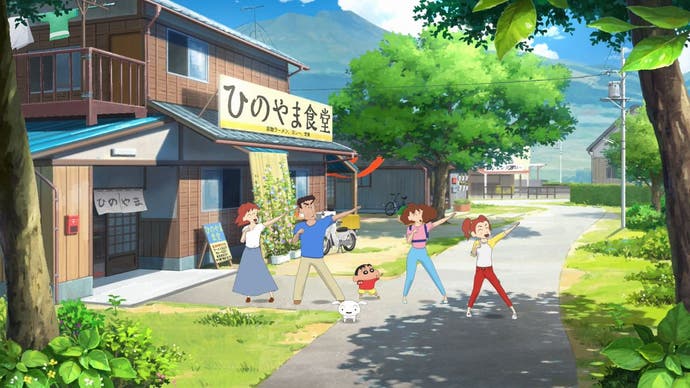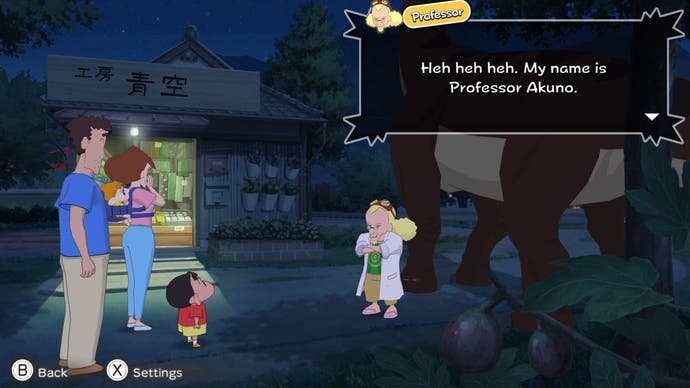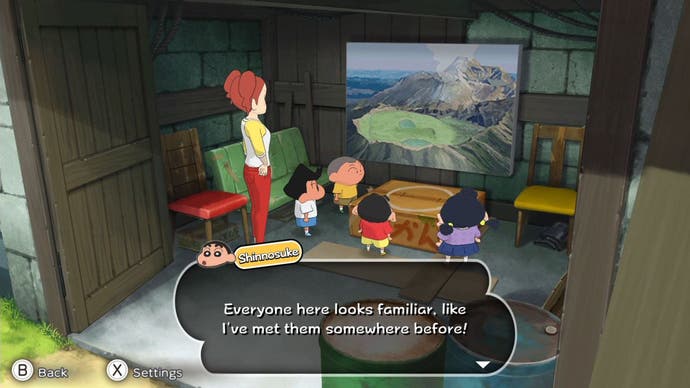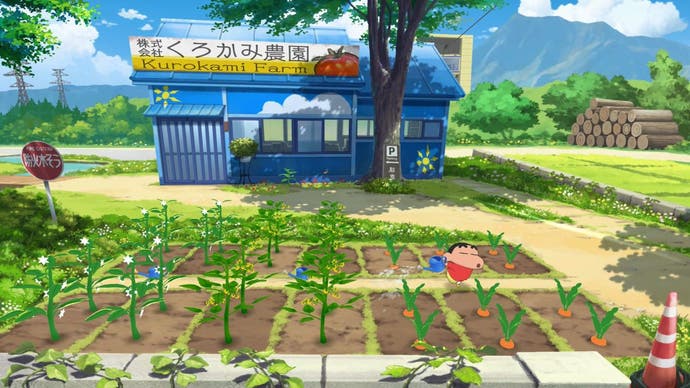Shin Chan: Me and the Professor on Summer Vacation - The Endless Seven-Day Journey review - the best kind of doing nothing
Escape, roam.
I've been watching the genuinely still very good Phineas and Ferb for the first time in over a decade recently, a show that is essentially about doing absolutely everything you can on summer vacation. The absurdity of it is wonderful, but if we reduce it to just 'doing a LOT while it's summer,' it's not that relatable to me. Which is why it's slightly ironic that I've been playing Shin Chan: Me and the Professor on Summer Vacation, a game where you do almost nothing, something I find reflects me much better. And it lets you do nothing in the most soothing ways possible.
Before I go into why a game where you don't do much is somehow a good thing, we need some important context. Shin Chan might be familiar to you if you, like me, watched it on Cartoon Network as a kid, but the Summer Vacation series is one you're less likely to be familiar with.
Boku no Natsuyasumi (or My Summer Vacation) originally appeared on the first PlayStation in 2000, but unfortunately was never released in English. It was made by developer Millenium Kitchen, who also made Shin Chan: Me and the Professor, and is quite simply a game about a young boy exploring a countryside village. You collect bugs, bottle caps, and meet the locals, and not much else. And while I've not had the opportunity to play the game due to the language barrier, it looks like exactly my shit.
Then came the news not too long ago that Shin Chan: Me and the Professor was getting an official English translation, instantly skyrocketing it into my most anticipated release this year. And while the game has the Shin Chan IP overlaid, it is essentially just a new Boku no Natsuyasumi (which did spawn a number of sequels).

You might have some questions at this point like, 'do you really just catch bugs?' or 'is there a deep emotional plot to spur you on?' The answers of which, in order, are no, you also catch fish, and no, the plot is mostly incredibly simple.
If you're looking for a title filled to the brim with gameplay options, you won't find it in Shin Chan. Your day to day activities include, as I said, catching bugs, fishing, walking, and toy dinosaur battles. Animal Crossing fans will absolutely find the appeal in the first two in that list, as they are functionally the same, although there's no museum to donate them to. You do so simply for the fun of it.
The bug and fish catching, while a fun activity to do, isn't what makes Shin Chan so delightful though. It's the town of Asso that you slowly explore more and more of that keeps you wanting to move forward.

Shin Chan is quite literally a PS1 game for the modern era, complete with pre-rendered backgrounds from animation studio Kusanagi. Everything has a fixed camera angle, and because of that we are treated to some of the most gorgeous video game environments I've seen this year.
Every day is a beautiful day in Shin Chan, with endlessly blue skies adorned with the fluffiest of clouds, rays of sunshine gently brushing the landscape. It's the kind of imagery where if you were to look at the word idyllic in the dictionary, you would find images of these backgrounds.
Yet you don't have access to every area in the town at first. Some places are blocked off by construction works, or a dentist's sign (Shin Chan is very afraid of the dentist, you see), and you have to wait for them to open up. Once they do, you're unlikely to find anything new other than more expertly crafted backgrounds, but that was reward enough for me.
There will be different bugs to catch, and new fish to find, but it's mostly exploring for the sake of it. I can't think of anything more appealing than that for a five-year-old, which Shin Chan himself will constantly remind you of. And it reminds me of how I spent my own summers, exploring for the sake of it, not really finding that much, but simply enjoying existing in that space at that time.

At some point in time, in getting to know the town more you'll eventually be introduced to a not-so-secret secret base where those dinosaur battles I mentioned take place. In practice, they are very simple turn-based battles that see you playing rock paper scissors, but the presentation of the toys as if they are real absolutely displays the power of a child's imagination.
There are also collectible cards to be acquired that boost the stats of your dinosaurs, and considering how avid a collector of Yu-Gi-Oh and other cards I was as a child, this satisfied me to no end. There is no greater reason to collect and battle, it's just a way to have fun with your friends, which to me is a pillar of childhood. Doing for fun, not for purpose.
One thing to be conscious of is that Shin Chan can get tired, and if he runs out of energy he'll collapse and wind up back at the house he's staying at, though there's no consequences other than losing some time. You lose energy by moving from screen to screen, which is a fun way to encourage you to memorise the layout of the town, and figure out which routes are quickest, if only for the satisfaction of doing so.
Of course, there is a plot to be found, one that is absolutely catered to a younger audience. The titular professor features quite prominently due to his use of a time machine that summons dinosaurs from the past. Jurassic Park would suggest that dinosaurs would immediately cause chaos, but they're mostly pretty chill, and the townspeople even grow to care for them.
It is one of the most low stakes stories I've experienced this year, and in a year filled with as much pressure as it is, it's something I greatly appreciate. The story isn't really about the dinosaurs, but how the townspeople live their lives around them, and how Shin Chan as a five-year-old can help them.
Being the loveable goof that Shin Chan is, his help is normally well-intentioned but not always productive, yet still everything works out in the end, because a game like this couldn't have anything too dramatic happen.
Because of that lack of pressure, Shin Chan acts as the perfect, relaxing escape. Animal Crossing, as lovely as it can be, also has the strong potential to be stressful if you can't design your island just right, but Shin Chan asks so little of you that you couldn't possibly get stressed.
I want to be clear that games that do challenge the player with uncomfortable and important themes absolutely have an important place in the canon. But Shin Chan is equally deserving of such a place because, at least in the world of big releases, there's not much like it, especially considering Boku No Natsuyasumi is quite inaccessible outside of those who speak Japanese.
We can't escape the real world forever. I know that, you know that. It's not even what I want long-term. But we all deserve a week off here and there, and I think many of us would greatly benefit from being able to do nothing without a shred of guilt. And Shin Chan, a game about spending a week doing nothing, is one of the most perfect kinds of nothing you can do.

.jpg?width=70&height=70&fit=crop&quality=60&format=png&auto=webp)
